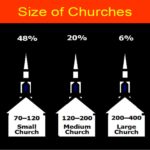A shift is taking place in the western world, a shift that will become even more noticeable in the years to come. According to Tom Rainer, Church buildings will become smaller than they have been in the past 35 years. As church leaders decide to build, a large number of them will decide to build smaller than most of their predecessors have in previous years.
The trend for the past four decades has been to build increasingly larger church buildings. And while the large church campus will not disappear, you will notice more intentionality to build or buy smaller. Why? Here are seven reasons, and only two of them are related to declining attendance. The first two will cover this scenario.
- Decreasing frequency of attendance among church members. The informal definition of an ‘active’ church member a decade ago was a person who attended worship services an average of three to four times a month. Now a member can be present only twice a month and be considered active. That trend is definitely adversely affecting attendance.
- The growth of the ‘nones’. Research has found that the number of people who say that they have no religious affiliation is increasing. This shift is huge. Over 50% of people will likely never visit your worship services, and they no longer feel a cultural compulsion to do so.
- The growth of the multi-site and multi-venue church. This movement is still growing. Church leaders are strategically starting different campuses to bring the church to the population rather than expect the people to come to one central location. Churches are more likely to have smaller campuses or use one complex on multiple days than to have one large building.
- The Post-moderns’ aversion to larger buildings. This trend appears in research of this generation born after 1990. I experienced this sentiment personally with post-modern pastor when I went on a tour of a large church campus with him. I came away impressed with not only the size of the place, but its functionality as well. My post-modern friend remarked that he hopes he never has to build something that large. I also went to a small church with little parking with him. I noted that only about 200 people could ever worship there. He countered that 2,000 could be at the worship services each week if it were strategically used throughout the week.
- Governmental agencies are increasingly unfriendly to church building plans. Numbers of churches run into big roadblocks with zoning authorities that refuse to let them build or expand. Some of the zoning authorities fear increased traffic issues in residential areas. I suspect many of them are concerned about more property that will be exempt from rates.
- The shift in emphasis from the big worship event to an emphasis on groups. Worship services will not go away. Preaching will remain central. But an emphasis on worship services as the big event will not be as great. Church leaders are giving more of their energy to the development of healthy leaders and groups. As a side note, watch for an increased demand for small group pastors or discipleship pastors. As worship pastors were sought after during the past 30 years, so will these other staff members be recruited or developed for the years ahead.
- The desire to spend more on ministry and less on facilities. Church facilities have grown in proportion to expenses of churches over the past four decades. Church leaders are looking for more funds for ministry, and they will find those funds by reducing facility costs. The big worship centre will not be built by many congregations, so they will have more funds to reach and minister to the community and beyond.
This trend toward smaller buildings has already begun, and it will only accelerate. An ancillary issue will be the challenge of churches to do something wise with existing buildings that will continue to have higher percentages of vacant seating.

Colin is the Director of ResourceZone International. He has 30 years of ministry experience as a pastor, college lecturer and consultant/coach to consultants, denominational leaders and local church pastors. He can be reached at info@resourcezoneinternational.com




Comment here